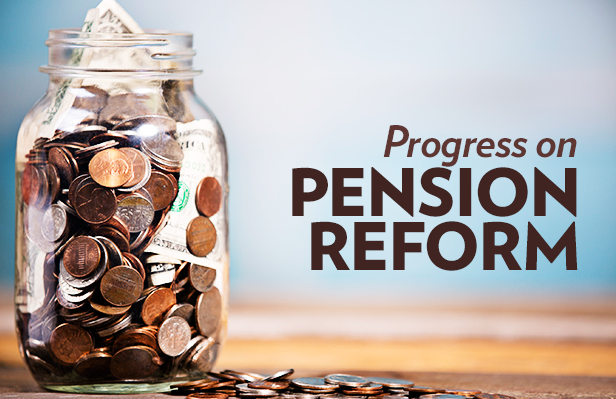Media

Latest Pension Bill a Mixed Bag
Yesterday the State Senate passed a revised pension reform bill (SB 1082) including a side-by-side hybrid, with a smaller defined benefit pension and a defined contribution component. The changes apply to PSERS employees in 2017 and SERS employees in 2018. This reform is weaker than SB 1 (vetoed by the governor) and while a step in the right direction, it doesn’t get the politics out of pensions.
The bill's defined benefit component includes:
- 4% employee contribution rate for PSERS; 3% employee contribution rate for SERS
- Benefit accrual of 1% of final salary (this represents about half the benefit for post-Act 120 hires under the current defined benefit plan)
- PSERS employer benefits vest after 5 years; SERS vest after 10 years
The defined contribution component includes:
- 3.5% employee contribution for PSERS; 3.25% employee contribution for SERS (option for additional employee contributions)
- Employer contribution rate of 2.5%
- A portable benefit for employees
- Employee contributions vest immediately, employer contributions after 3 years.
Here’s the good news:
- Real savings: SB 1082 provides real savings by closing loop-holes that inflate pensions for current employees. The anti-spiking provision alters the pension formula’s final average salary calculation to end the practice of excessive overtime at the end of one's career to dramatically increase pension payments. Changes to the lump sum payment option ensures taxpayer costs will not increase if an employee chooses to receive their benefits in a lump sum.
- Limits taxpayer risk: A risk sharing provision reduces, but does not eliminate, risk for taxpayers due to potential investment losses. This provision periodically adjusts the employee contribution rate in the event of poor investment performance by PSERS and SERS.
- Begins to empower employees: SB 1082 takes an important step forward by establishing defined contribution plan that will protect workers' pensions from political manipulation.
The bad news:
- Continues to underfund pensions: The bill reduces “collared” contribution rates, which further underfunds the plan and adds an estimated $500 million to the unfunded liability.
- Lacks transparency and passed illegally: The bill suspends the law that all pension bills have an actuarial note attached before a vote is held. Actuarial notes summarize any changes and estimate the cost to taxpayers. This is a stunning lack of transparency.
- Keeps the politics in pensions: The pension bill includes a few reforms, but continues to allow political forces to overpromise and underfund the pension system, leaving taxpayers on the hook.
It's also worth noting an important change for lawmakers. They will be switched to the hybrid pension plan upon reelection, but they will have the option to remain in the old defined benefit system.
Pennsylvania must transition state workers to defined contribution plans. The commonwealth owes $53 billion in unfunded pension debt, and that number grows every year. Only full reform will get politics out of the pension system—making it more fair, more reliable and sustainable.